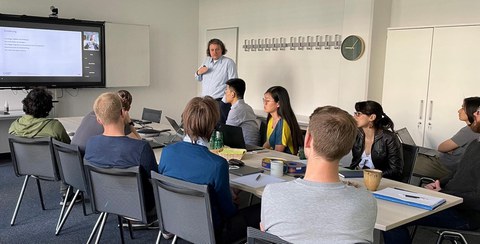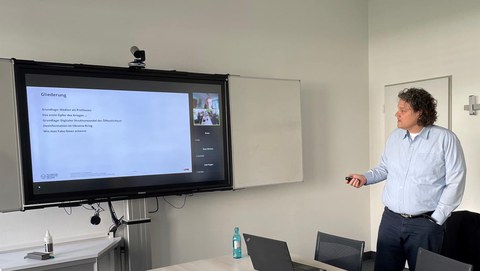Jun 02, 2022
Guest lecture by Prof. Hagen: "Communication as a weapon of war"
"Communication as a weapon of war - and how to deal with it as an audience" - with this interactive lecture, Prof. Lutz Hagen, holder of the Chair of Media and Communication (focus on economic and political communication), managing director of the Institute for Communication Science, and co-speaker of the Boysen-TU Dresden Research Training Group captivated the members of the RTG on June 2nd, 2022.
"All warfare is based on deception." is a quote from Sun Tsu, who lived around 544 - 496 BC, and wrote the booklet "The Art of War". He clearly understood a lot about strategy and human nature despite living more than 2,500 years ago. Prof. Hagen gave a historical outline of the role of media and in what form the media have always played a role in world politics and how they are constantly subject to structural change. After an initial structural change from "information in the coffee house" to linear television (1960s), the media structural change from linear television to Web 2.0 (about 2010) took place. This change was followed by the digital structural change of the public sphere, in which social media increasingly play a leading role and the traditional media increasingly lose their gatekeeper function*. (*Gatekeeping: limiting the amount of information by selecting topics deemed worthy of communication). Prof. Hagen illustrated this with the example of various war reports. Examples were the Vietnam War, the 2nd Gulf War (live reporting), and the Ukraine War as the 1st live war on the internet, where even bloggers post pictures and information that is becoming increasingly difficult to check for credibility. The Ukraine war is also considered an information war in which threats can be reported or even manufactured.
How do you recognize fake news? Prof. Hagen also gave some valuable tips on this, including some examples of fact-checking sites:
https://www.mimikama.at/
https://www.tagesschau.de/faktenfinder/
https://de.bellingcat.com/
https://correctiv.org/faktencheck/
https://waronfakes.com/de/
For pictures, the reverse search at https://images.google.com/ is a good option.
The discussion afterwards included the topics of credibility of information, the decline of print media, and how they can still be operated profitably. At the beginning of his lecture, Prof. Hagen presented statistics showing how certain age groups obtain information. The share of print media here was clearly reduced with decreasing age of the respondents. According to Prof. Hagen, this behaviour will not change with age.
Thank you for the highly interesting lecture! "The greatest vulnerability is ignorance" (Sun Tsu).

Prof. Hagen and his listeners

